Tiempo Climate Cyberlibrary
Climate Change and Nepalese Youth
- Tiempo archive
- Complete issues
- Selected articles
- Cartoons
- Climate treaty
- Latest news
- Secretariat
- National reports
- IPCC
About the Cyberlibrary
The Tiempo Climate Cyberlibrary was developed by Mick Kelly and Sarah Granich on behalf of the Stockholm Environment Institute and the International Institute for Environment and Development, with sponsorship from the Swedish International Development Cooperation Agency.
While every effort is made to ensure that information on this site, and on other sites that are referenced here, is accurate, no liability for loss or damage resulting from use of this information can be accepted.
 |
Abhishek Shrestha reports on the role of Nepalese youth in climate change activities. |
| The author is coordinator, responsible for programme design and management, with Nepalese Youth for Climate Action. | |
Nepal is likely to be one of the countries hardest-hit by climate change, despite being one of the smallest contributors to the problem. Scientific and anecdotal evidence confirms that climate change is already impacting communities in Nepal through the melting Himalayas, changing monsoon patterns that have a direct affect on water resources and reduced crop yields, which leads to food insecurity. A large percentage of the Nepali population needs significant assistance to adapt to the changing climate and to protect their centuries-old traditions and livelihoods from climate impacts.
Nepal is at high risk from the impacts of climate change, but sadly this issue has not been prioritized at national level. Taking in to account the susceptibility of Nepal's Himalayas and the Nepalese economy, which is heavily dependent on agricultural and natural resources, it is essential to make people aware of climate issues.
Youth have a major stake in climate change in general and in the outcome of the climate change treaty in particular. Young people are a very important part of our society as they are future decision makers and can play a vital role in popularizing the issue among friends, family members, peers and the wider community. Youth are the backbone of the nation who can influence others to bring about change.
There is already significant mobilization of youth at the international level, articulating national and international efforts to reduce emissions. In particular, some nations have a strong youth network fostering youth leadership and dialogue on climate change. With a mission to protect Nepal from the effects of climate change through a diverse, nationwide, youth-led movement, a youth group on climate change, Nepalese Youth for Climate Action (NYCA), has been established.
NYCA is a coalition of Nepalese youth and youth groups tackling climate change, the biggest challenge of our generation. NYCA works with universities, schools, organizations, elected officials and communities in Nepal and abroad to protect our future from the threats posed by climate change. We inspire, educate, empower and mobilize young Nepalese to create a future that is economically prosperous, environmentally sustainable, and socially just.
NYCA is involved in a number of projects.
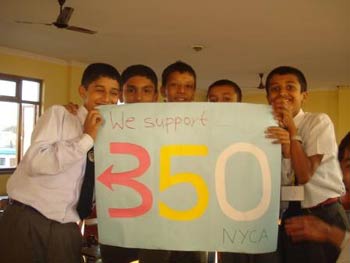 |
School interaction programme
© NYCA |
To make young people aware of the issue of climate change, an awareness programme on climate change is being carried out in the schools and colleges of Kathmandu Valley through presentations and documentaries. NYCA is planning to take these campaigns all over Nepal. NYCA is also developing a college network through the College Climate Wing programme.
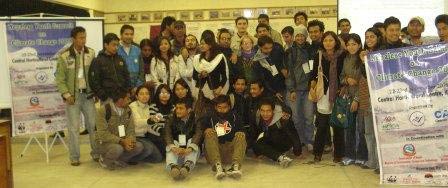 |
|
Nepalese Youth Summit participants
© NYCA |
With the objective to form a unified youth voice on climate change and create a youth charter/declaration on climate change, the first-ever Nepalese Youth Summit on Climate Change was organized in November 2008 in co-ordination with the Ministry of Environment, Science and Technology and the Ministry of Youth and Sports. Young people from different parts of the country participated in the summit. The Summit Declaration was handed to science and technology minister Ganesh Shah.
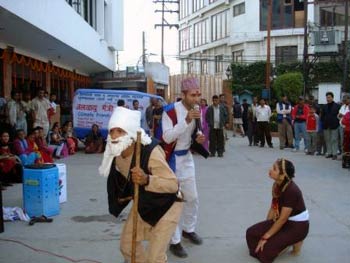 |
Drama performance
© NYCA |
Aiming to make people aware of the issues of climate change and the environment through our culture, the Deushi-Bhailo programme, blending informative drama, songs and demonstration, was carried out on the auspicious occasion of Dipawali, the Festival of Lights.
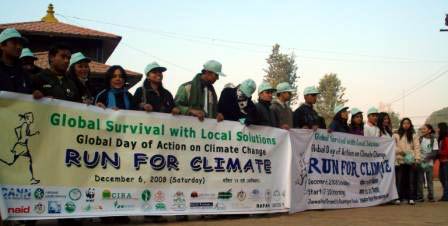 |
|
Run for Climate
© NYCA |
The Run for Climate was organized in Kathmandu in coordination with 29 other organizations. The campaign synchronized Nepal's climate activities with international climate activities coordinated by the Global Climate Campaign. The basic aim of the programme was to make people aware of climate change and to demand that world leaders take the urgent action required to prevent the catastrophic destabilization of global climate.
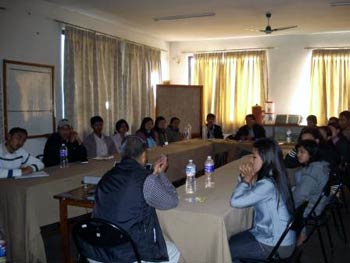 |
Climate Talk
© NYCA |
An interaction programme called Climate Talk takes place every alternative Friday. The objective is to inform young people on recent issues of climate change. The programme provides an opportunity for youth to discuss research carried out by them on climate change.
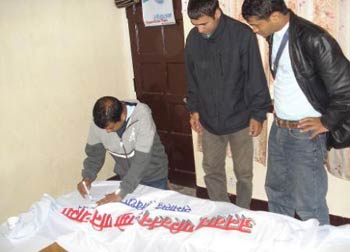 |
Collecting the commitment of Gagan Thapa,
Constitution Assembly member, on a banner
© NYCA |
The aim of the Ghar Dailo awareness programme is to make Constitution Assembly members aware of climate change and to commit them to effective climate action, including the formulation of policies on climate change and addressing the climate issue in the new constitution. NYCA has the target of reaching the 601 Constitution Assembly members.
A message on climate change was published in the English-language Nepali daily The Himalayan Times on December 6th 2008. The main objective of publication of the message was to make people aware of climate change, to gather the views of concerned people on the issue, to share ideas regarding how to save Mother Earth from global warming and to support the global demonstration on climate change.
NYCA is on the way to publishing a magazine on the climate issue for youth and is planning to run a radio programme on climate change targeting the young people of the country.
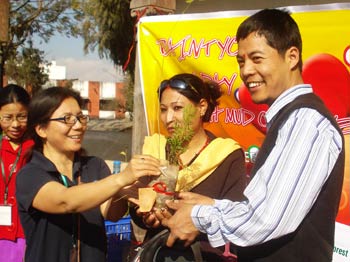 |
Plant a Tree and Grow in Love
© NYCA |
On the occasion of Valentine's Day, February 14th 2009, NYCA, LEAD Nepal, Organic Village and the Department of Forest jointly organized a programme in which tree seedlings were distributed as a Valentine gift to couples who visited Sidhapokhari, Bhaktapur, a romantic spot for young people. The theme was "Plant a Tree and Grow in Love". The couples were briefed about the importance of trees in saving the earth's degraded environment. They were told that the tree will symbolize their love so they would need to protect it well. Two hundred plants were distributed to 100 couples.
We believe that climate change is a global challenge. There is still an opportunity for us to address this challenge. NYCA works with allies at the international level to ensure that global greenhouse gas emissions are reduced at the rates necessary for our survival. In coordination with other youth networks of South Asia, NYCA is planning to organize a South Asian Youth Summit on Climate Change.
Through our collective actions and initiatives, we hope to ensure that a future is indeed possible for us. NYCA is determined to contribute to the global effort, in line with the principle of common but differentiated responsibilities. We also believe that developed countries must assume greater commitments in line with their responsibility.
Further information
Abhishek Shrestha, Nepalese Youth for Climate Action Secretariat, Clean Energy Nepal, Kamladi, Ganesthan, PO Box 24581, Kathmandu, Nepal. Email: aviish27@gmail.com. Web: www.nyca.net.np.
On the Web
The Tiempo Climate Cyberlibrary lists websites covering youth activities on climate change.
Bright Ideas

General Electric plans to cut solar installation costs by half

Project 90 by 2030 supports South African school children and managers reduce their carbon footprint through its Club programme

Bath & North East Somerset Council in the United Kingdom has installed smart LED carriageway lighting that automatically adjusts to light and traffic levels

The United States National Oceanic and Atmospheric Administration and the American Public Gardens Association are mounting an educational exhibit at Longwood Gardens showing the link between temperature and planting zones

The energy-efficient Crowne Plaza Copenhagen Towers hotel is powered by renewable and sustainable sources, including integrated solar photovoltaics and guest-powered bicycles
El Hierro, one of the Canary Islands, plans to generate 80 per cent of its energy from renewable sources

The green roof on the Remarkables Primary School in New Zealand reduces stormwater runoff, provides insulation and doubles as an outdoor classroom

The Weather Info for All project aims to roll out up to five thousand automatic weather observation stations throughout Africa

SolSource turns its own waste heat into electricity or stores it in thermal fabrics, harnessing the sun's energy for cooking and electricity for low-income families

The Wave House uses vegetation for its architectural and environmental qualities, and especially in terms of thermal insulation

The Mbale compost-processing plant in Uganda produces cheaper fertilizer and reduces greenhouse gas emissions

At Casa Grande, Frito-Lay has reduced energy consumption by nearly a fifth since 2006 by, amongst other things, installing a heat recovery system to preheat cooking oil
Updated: May 15th 2015